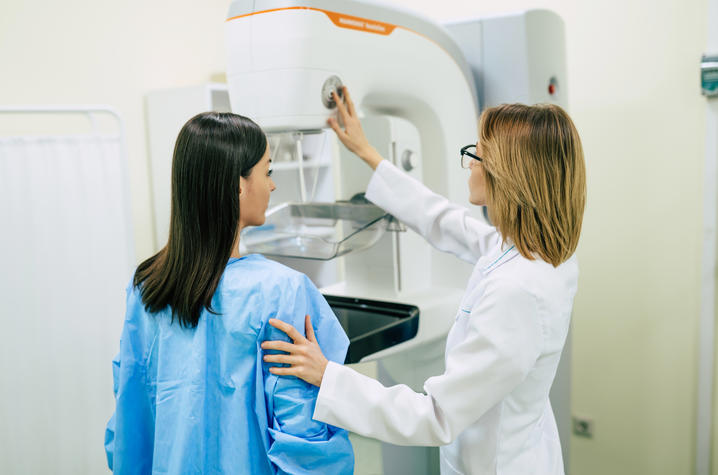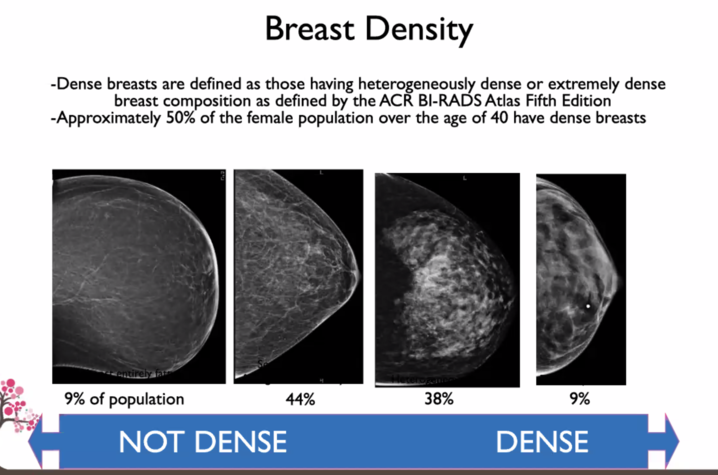How new FDA rules on breast density could affect mammogram results
The University of Kentucky Public Relations and Strategic Communications Office provides a weekly health column available for use and reprint by news media. This week’s column is by Aurela Clark, M.D., radiologist with the UK Markey Cancer Center.
LEXINGTON, Ky. (Aug. 19, 2024) - In September 2024, new guidelines from the Food and Drug Administration (FDA) will require that all women receive information about their breast density following a mammogram.
This change aims to empower women with more knowledge about their breast health, but the new information could also cause confusion or worry for patients. Here are some facts about breast density, the new guidelines and what they mean for you.
What is breast density?
Breasts contain a mix of fatty, glandular and fibrous tissue. “Dense” breasts have a higher proportion of glandular and fibrous tissue compared to fatty tissue. It’s important to note that breast density is only detectable on a mammogram and can’t be felt during a self-exam or clinical exam.
How common are dense breasts?
Very common. About half of all women over 40 have dense breasts. It's more common in younger women and those with a lower body mass index, but it can affect women of all ages and body types.
Why does breast density matter?
Dense breast tissue can make it harder to spot cancer on a mammogram because both dense tissue and tumors appear white. Additionally, women with dense breasts have a higher risk of developing breast cancer. The greater the breast density, the higher the risk.
What's changing with the new FDA guidelines?
Beginning in September, all mammogram reports must inform women whether their breasts are considered “dense” or “not dense.” The report will also explain that dense tissue can mask cancer on mammograms and may increase cancer risk.
Does this mean I need additional screening if I have dense breasts?
Not necessarily. It is recommended that women with dense breasts talk to their doctors about breast density and how it affects their personal risk of breast cancer. Other imaging tests such as MRI, contrast-enhanced mammography or screening breast ultrasound might help find cancers in some people with dense tissue, but these also may require the patient to undergo a work-up of other findings and at times additional biopsies that may turn out to be benign.
What should I do if I’m told I have dense breasts?
First, don't panic. Dense breasts are normal and common. Here are some steps to consider If you are told that you have dense breasts:
- Make it a point of discussion with your doctor at your next annual exam to help you figure out the right course of action for seeking supplemental screening — weighing your overall breast cancer risk level, personal preferences, the availability and cost of additional imaging.
- Ask about the potential benefits and drawbacks of the additional screening tests as well as their availability.
- Discuss your overall breast cancer risk with your health care provider starting at age 25. Factors like family history and previous biopsies are important.
Will insurance cover additional screening?
Coverage varies by state and insurance plan. Some states, including Kentucky, require coverage for supplemental screening. Discuss potential costs with your health care provider and insurance company.
Remember, these new guidelines are about empowering you with information. They’re not meant to cause alarm, but to help you and your health care provider make informed decisions about your breast health. If you are of average risk, annual mammograms starting at age 40 are important for early detection of breast cancer.
UK HealthCare is the hospitals and clinics of the University of Kentucky. But it is so much more. It is more than 10,000 dedicated health care professionals committed to providing advanced subspecialty care for the most critically injured and ill patients from the Commonwealth and beyond. It also is the home of the state’s only National Cancer Institute (NCI)-designated Comprehensive Cancer Center, a Level IV Neonatal Intensive Care Unit that cares for the tiniest and sickest newborns and the region’s only Level 1 trauma center.
As an academic research institution, we are continuously pursuing the next generation of cures, treatments, protocols and policies. Our discoveries have the potential to change what’s medically possible within our lifetimes. Our educators and thought leaders are transforming the health care landscape as our six health professions colleges teach the next generation of doctors, nurses, pharmacists and other health care professionals, spreading the highest standards of care. UK HealthCare is the power of advanced medicine committed to creating a healthier Kentucky, now and for generations to come.






